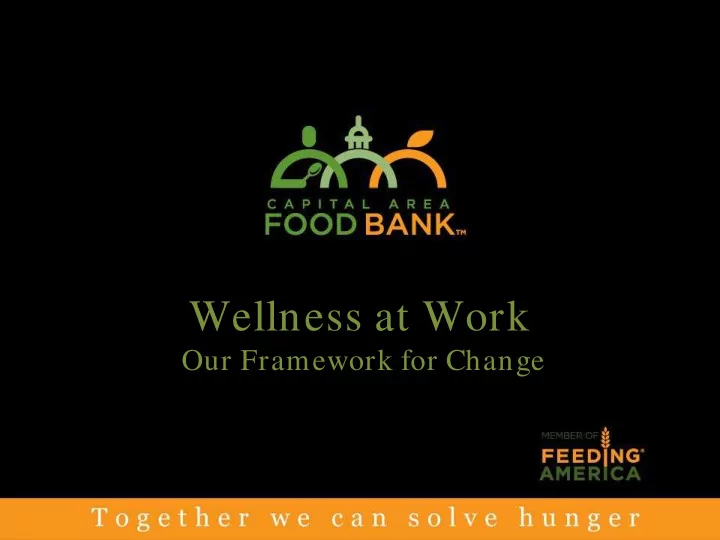

Wellness at Work Our Framework for Change
The Basics Founded in 1980 to serve Washington, DC and surrounding suburban areas in MD and VA. Current statistics: 130 staff at two facilities; 26,000 volunteers annually; 540,000 individuals receiving food and services through 444 non-profit food assistance partners and around 400 direct distributions; and 46 million pounds of food distributed, 1/3 of which is fruits and vegetables. 2
1. Recognize health and wellness as a part of your organization’s m ission, vision, values, and strategic plan. 3
Laying the Foundation - Let’s Move! 2012: Moved to new facility to address capacity constraints. 4
New Places, New (and Old) Faces 2013: Executive leadership transition and development of new five year strategic plan. Development process was highly inclusive: All CAFB staff given opportunities to give feedback through drafting process; Retail donors and key supporters consulted; Approved by CAFB Board of Directors. 5
Our Roadmap: Strategic Objectives Stronger Healthier Smarter Broader Engage the community in Reduce food waste as we awareness about hunger address hunger needs. and how to solve it. 6
Our Values 2015: Mission, vision, and values statements revised and simplified. 7
2. Align your operations with wellness goals, m onitor progress, and m ake adjustm ents when needed. 8
Going all in for Inventory Food Type Attribute What is Wellness? 03- Beverages Beverages None are Wellness 04- Bread and Bakery Fiber Whole Grain First Ingredient 05- Cereal Sugar < 7 grams of sugar per serving 06- Complete Meals/Entrees/Soups Sodium < 450 mg of sodium per serving 2014: CAFB creates a 07- Dairy Sugar All are Wellness 08- Desserts Sugar None are Wellness wellness tracker to 10- Fruits Sugar <15 grams of sugar per serving track the nutritional 11- Grains Fiber Whole Grain First Ingredient 14- Juices Sugar 100% juice on label content of its inventory. 15- Meats/Fish/Poultry Sodium < 250 mg sodium per serving 16- Mixed and Assorted Food Mixed Unranked 21- Pasta Fiber Whole Grain First Ingredient For beans, <140 mg sodium per serving. All peanut butter is Wellness 23- Protein- (non-meat) Sodium Food 24- Rice Fiber Whole Grain First Ingredient 25- Snack Foods/Cookies Sugar <12 grams sugar 26- Spices/Condiments/Sauces Sodium < 150 mg sodium 27- Vegetables Canned/Frozen Sodium < 140 mg sodium per serving 28- Produce Produce All are Wellness 9
Going all in for Inventory, Cont’d Wellness report helps CAFB secure more nutritious food and chart progress from baseline. Wellness rankings influence CAFB partner behavior. 10
3. Solicit buy-in and support for wellness from key stakeholders and m ake them a part of the process. 11
Bring Food Donors to the Table Early & Often Retail donors are encouraged to give feedback on strategic plan and are continually engaged throughout transition and before any major policy shift. Specific feedback on non- wellness donation can produce unexpected (positive) results. Recognize those donors who go above and beyond. 12
No Surprises! September 2016: New CAFB food acceptance policy – no longer accepting holiday candy, non-bread bakery items, and full-calorie sodas. 13
4. Reinforce wellness practices through resources, training, and internal and external com m unications. 14
Turn it Up (and out)– Low Barrier Resources Nutrition education + healthy food promotion for partner agencies and participants Recipe Cards Produce Guides 7 Ways to Use 15
Be Loud, Be Proud 16
Make a Commitment and Stick to It May 2017: CAFB becomes one of first non-profits to make a commitment to Partnership for a Healthier America. 17
Recommend
More recommend